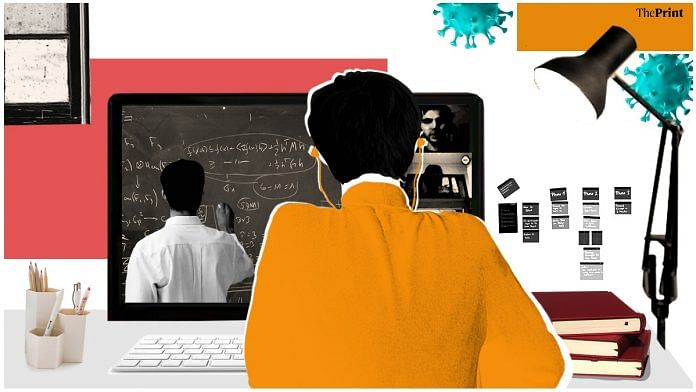New Delhi: The Narendra Modi government could procure video conferencing solutions to ramp up infrastructure for general online meetings, virtual classrooms and medical clinics amid the Covid-19 crisis.
The move comes due to a spike in subscription to video conferences among government officials, online classes in schools and patients preferring telemedicine instead of physical medical consultations.
State-run Broadcast Engineering Consultants India Ltd (BECIL) initiated the tender process earlier this month seeking software-based solutions from private firms for three video conferencing categories — general meetings, education and healthcare.
The Expression of Interest (EOI) document seeks a platform for general video conferencing to support secured virtual room-based setups, where only registered participants are authorised, and link-based option for public or open conferences with lock-conference room feature. It should also support firewall traversal for secured calling through the internet and intranet, be fully encrypted and support multiple sessions together.
A webinar option to support 100 panelists and up to 1,00,000 participants has also been sought.
The solutions will be used by government establishments across the country. Currently, the government is using a video conferencing platform developed by the National Informatics Centre (NIC) for its day-to-day online meetings.
The document also spells out the requirements for the other two categories.
A senior government official said with Covid-19 cases rising daily, there is an urgent need to restrict meetings in person and resort to online solutions for different aspects of day to day life, including education and healthcare.
“It is extremely risky to come back to the days before the pandemic. In the government, we have to increasingly depend on online working solutions, such as video conferences and e-files given that staggered timings and work from home continues for much of the staff,” said the official, who didn’t wish to be named.
“There is a need to expand the digital infrastructure to multiple online solutions and not be dependent on just the existing modes offered by the government,” the official added.
The tender would give a fair idea on the available technologies and their prices so that they can be provided to the clients immediately on requirement, a second official said on the condition of anonymity.
Ever since the lockdown was enforced in March, the country has seen a sharp surge in the use of video conferencing platforms such as Zoom, Microsoft Teams and Google Meet with an unprecedented number of people working from home and educations institutes resorting to online classes.
The Department of Personnel and Training (DoPT) had last month come out with a draft framework for ‘work from home’ for the staff after lockdown. In a communique to all central government departments, it had said the pandemic necessitated many ministries to operate from home to maintain social distancing, and that it was likely the offices would continue to go for staggered attendance and variable working hours to maintain social distancing at workplace.
“…a broad framework for work from home is important to standardize the operating procedure even post lock down situation and to ensure safety and security of information, while accessing government files and information remotely from home,” it said.
Also read: 12 per cent of elite AI researchers come from India but almost none work here, says data
Platform for virtual classes for students
For the education sector, the BECIL document states that the required platform should ensure “seamless lecture delivery” to all students connected from different locations with “crystal clear Audio-Visual Experience”.
Students should be able to see the live video of teachers delivering the lecture and be able to click the “Q&A button” for doubts, “Raise Hand”, and seek attention without disturbing the entire session. “The teacher should have the option to answer queries immediately or at the end of the session,” it says.
Other features sought include allowing upload of custom designed content with topics and sub-topics, with video option for teachers and students, and a live attendance tool. It also should allow teachers to be able to upload content topics with specific subject permissions, create, edit, delete and publish course topics, files, questions, mark sheets and reports.
The move assumes significance as the government has been planning to raise digital infrastructure to cater to the number of students going for virtual classes due to Covid-19.
ThePrint had earlier reported that schools and colleges will run a blended learning model, where half of the classes would be online and the rest of the classroom interactions would be attended physically by the students.
Also read: The world’s most powerful supercomputers have joined race to stop coronavirus
For healthcare
The BECIL document states that the application server of the healthcare platform should provide for a virtual clinic system. It says the platform should serve as a remote medical consultation over live video with facilities to share reports, annotation, e-prescriptions and have integration options for a varied range of medical devices.
It should notify doctors about upcoming, rescheduled and canceled appointments, and feedback surveys, the document says, adding that the solution should allow patients to wait in a virtual waiting room while hosting digital signage to keep the patient updated or engaged.
It should be able to connect multiple cameras like webcams, PTZ cameras and endoscopic cameras. It also lists a series of roles for the doctors to ensure they are able to upload content for the waiting room.
The doctors should be able to share a screen and e-prescriptions during the call.
Also read: Mark Zuckerberg doesn’t seem to understand Facebook’s problem with Mark Zuckerberg



